A Writing Biography, Part VIII: The Exoskeleton, Archiving, Publishing, The Blog, and the Long Novels, 2011-2023
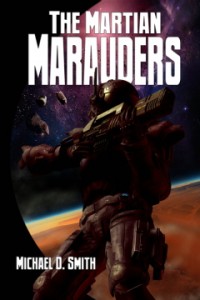 The period from March 2011, when The Martian Marauders was accepted for publication, to January 2023, retirement from the library, already finds expression in the blog, but I hope to pull together more insight here. It’s tempting to just narrate a timeline, but a catalog of drafts, inputs, scanning, and publishing merely checks off accomplishment boxes; it’s no substitute for growing and understanding. Part VIII will focus on themes.
The period from March 2011, when The Martian Marauders was accepted for publication, to January 2023, retirement from the library, already finds expression in the blog, but I hope to pull together more insight here. It’s tempting to just narrate a timeline, but a catalog of drafts, inputs, scanning, and publishing merely checks off accomplishment boxes; it’s no substitute for growing and understanding. Part VIII will focus on themes.
I banked my painting energies during this time, calling a halt to solo shows, though I still painted and continued to place works in group shows. I also drew scores of novel character images for the website and blog, and turned a childhood story, “Trip to Mars,” into a fun picture book. But the primary urge was my writing. Following are its themes.
Theme 1. The Exoskeleton
The Writing Biographies haven’t allotted much space to the major decision I made in 1981, after seven years of enervating insurance accounting work, to find a better method of supporting my art. Librarianship, 1981-2023, succeeded–but also had its drawbacks, as I outlined in the 2023 blog post, “The Exoskeleton”:
To support my art, in 1981 I developed what I called a “world structure” around a library career. It became a complex, evolving exoskeleton which sustained my art life well. Despite a few times when I probably admired the exoskeleton a little too much, and veered a bit off course, I stayed faithful with my art.
I’ve often maintained that the deleterious effects of my library world structure were simply the waste of time and energy that could have been spent on art and writing. But now I see another issue: the type of energy demanded. Keeping up with the endless problem-solving and decision-making, ranging from trivial daily concerns to the momentous issues that either bolster or threaten your career, as well as the unceasing interaction with people, their expectations, ambitions, and conflicts.
The following blog satire from 2016, Crisis! Restructure Major Metropolitan Library!, gives a hint at the career stress. Lest the reader scoff at the concept that library work is stress-free (so many candidates came to interviews armed with that erroneous concept), let me emphasize that while library work isn’t a life and death matter, any profession has its unique stresses that jar the human nervous system with similar flight or fight responses. The library world has confronted massive technological, social, and cultural changes over the past several decades, and daily addressing the needs of literally hundreds of people of all backgrounds and ages is extremely challenging. Then add municipal government, business fads, library websites, marketing, programming, and endless new gadgets to access an increasingly problematic Internet. While the Exoskeleton gave a background structure to my writing and painting–and a host of interesting topics to write about–in some ways it actually weakened them. The metaphor was:
Consider an astronaut who’s been in space for a year, but despite all his exercise in orbit, when he finds himself back on Earth he’s unable to walk.
Thus my goal in retirement the last couple years has been to rectify any artistic bone/muscle loss. There’s still so much to learn and to develop.
One aspect of the library world dovetailed with my art. I set up both an adult writers’ group and a teen writers’ group at the library and was delighted with the interaction with writers of all ages. We traded advice and learned much from each other.
After leaving webmaster and network administrator duties at Dallas Public Library in 2001, I found myself strangely outside technology for a few years, but around 2010 I reacquainted myself with Nooks, Kindle, iPhones, and eBooks as I could make use of them and teach them to library patrons. These refurbished tech skills neatly coincided with my 2011 publishing breakthroughs.
I’d long planned retirement from the library for January 2023, and while I was yet unaware of some of the Exoskeleton’s dubious side effects, I knew the change meant that both my writing and art would continue to evolve.
Theme 2. The Mike Archives
I’d long wanted digital backup of all my writing. In 2011 I picked up the pace, scanning a variety of older stories, letters, and essays, and by 2024 managed to scan to PDF or Word almost everything I’ve written. I’ll never return to much of this but I still want those digital copies. Though I’ve sometimes remonstrated myself for past-tripping, I’ve usually found buried energy in the older works. Even if some of this got a bit obsessive, it all has been a necessary prelude to new work.
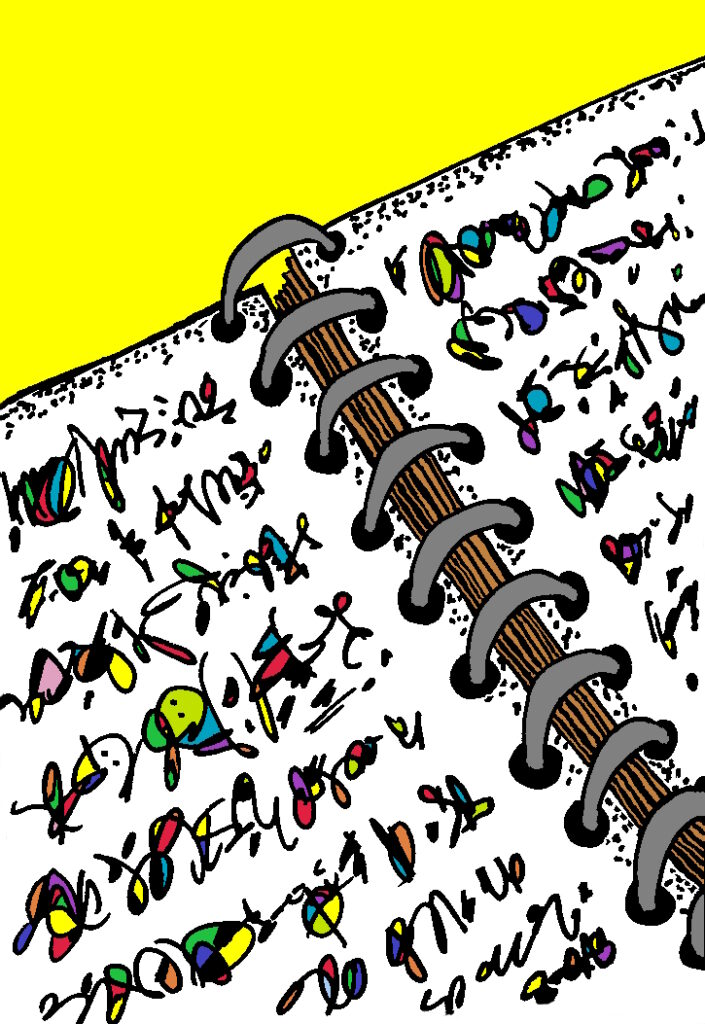 In the following list of this era’s archives, items in bold are revisions I eventually published:
In the following list of this era’s archives, items in bold are revisions I eventually published:
- 3/22/11-3/27/11: “An Introduction to Synthetic Thinking”(1979), scanned/OCR’d
- 5/19/11-5/26/11: “Helium Street” (1977), scanned/OCR’d
- 5/19/11-7/13/12: Akard Draft One (1976-1978) scanned/OCR’d
- 6/29/11-7/9/11: The Holy Dark Ages (1977 novella) edits
- 7/26/11: “The Martian Holes” (1975) scan/print
- 7/26/11-7/28/11: “Emerson’s Vast Hotel” (1972) scan/print
- 7/31/11: Executed Beauty (1983 novella) title changed to The Psychobeauty
- 8/5/11-9/14/11: The Soul Institute 2011, Draft 5A
- 8/21/11: The Fifty-First State of Consciousness (1973) reformatting
- 8/21/11: Nova Scotia (1973) reformatting
- 9/14/11-9/16/11: The Soul Institute, Draft 5B
- 10/8/11-11/9/11: Akard Drearstone 2011, Draft 10
- 3/30/12: “Trip to Mars” (1964 story) edits
- 6/20/12-6/23/12: “Roadblock” (1981) edits/print
- 6/28/12-7/26/12: CommWealth 2012 edits
- 7/14/12-12/28/13: Trip to Mars the Picture Book illustrations
- 9/6/12-11/27/12: Akard Drearstone 2012, Draft 11
- 3/14/13-4/21/13 “Damage Patrol” (1984) revision
- 5/17/13-7/26/13 Journal 2008 input
- 5/25/13-5/27/13 100 Dreams scanned/edited
- 7/6/13 2009-2013 journals to single-file manuscripts
- 12/14/13: CommWealth 2013 edits
- 12/16/13-12/5/14: The Soul Institute 2014, Draft 6
- 2/18/14-3/2/14: Journal 2007 input
- 10/3/14: “Existence” (1967) input
- 10/6/14: “The Saga of Billy Bam, Basketball Star” (1967) input
- 10/3-10/11: Input of eight other minor 1967-era stories
- 12/7/14-1/1/15: Journal #1, 1969-1971 input
- 12/27/14: “The Individual” (1970) scanned/edited
- 12/27/14: “The Mathematician” (1970) scanned/edited
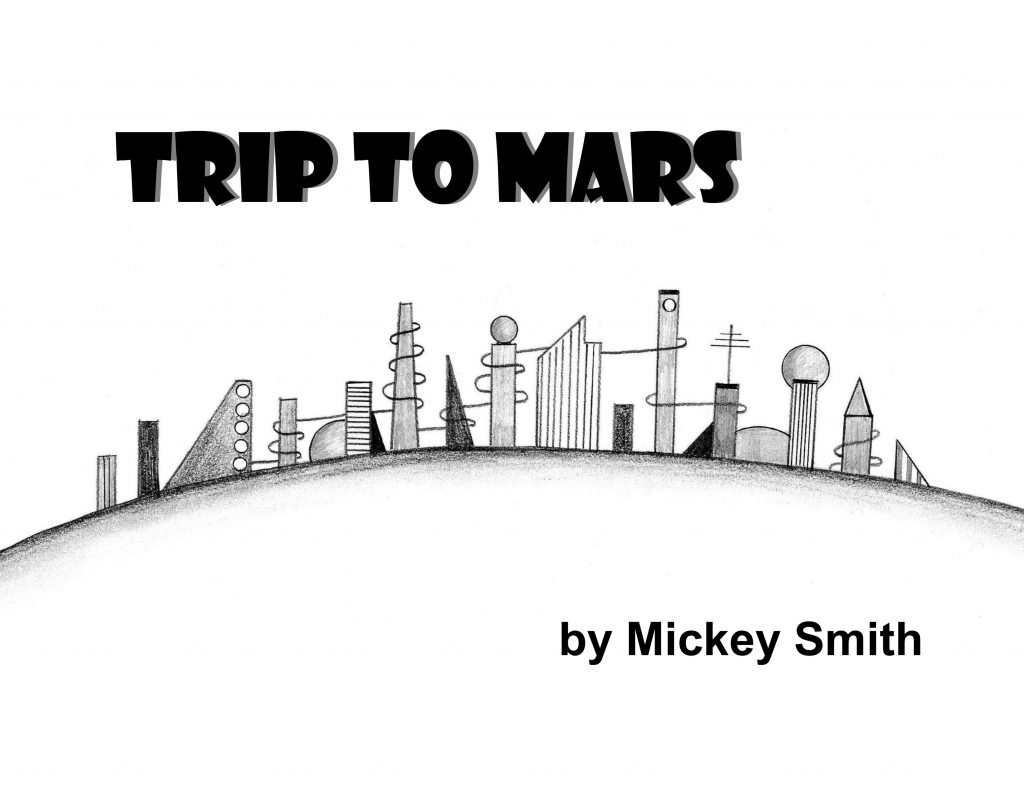 12/31/14: “Sam is Coming Home” (1970) input
12/31/14: “Sam is Coming Home” (1970) input- 12/31/14: “The Salamander Raid” (1968) scanned/edited
- 12/28/14: “War is Hades!” (1969) scanned/edited
- 12/28/14: “The Perfect Cube” (1968) scanned/edited
- 1/2/15-1/3/15: “Sam is Coming Home” (1987) scanned/edited
- 1/11/15: “Underground” (1971 Version 2) scanned/edited
- 1/18/15: “Underground” (1971 Version 3) scanned/edited
- 11/13/15-11/15/15: The Soul Institute Draft 1
- 12/17/15-12/18/15: Alternate Soul Institute created from The Soul Institute Draft 1
- 2/18/16-3/26/16: Journal 1971 input
- 4/9/16-8/14/16: Sortmind 2016, Draft 7
- 10/15/16: “Randy and Laura” edits
- 10/24/16-4/15/21: Nine Archetypes, experimental fiction from novel drafts
- 12/20/16-1/8/17: Journal 2006 input
- 2/2/17-3/5/17: Trip to Mars 2017 formatting for publication
- 2/19/17-5/24/17: Ocean Singe Horror retitled Jump Grenade, Draft 2
- 5/25/17-7/17/17: Akard Drearstone 2017, Draft 12
- 7/17/17-10/21/17: Akard Drearstone 2017
- 8/25/17-12/21/17: Sortmind Draft 8
- 12/22/17-2/11/19: Sortmind Draft 9 to MS.
- 1/30/18-2/23/18: Journal 1972 input
- 2/28/18-3/2/18: “The Desirable Fuck” (1972) scanned/edited
- 2/28/18-3/2/18: “Father/Children” (1972) scanned/edited
- 2/28/18-3/2/18: “A Playful Story” (1972) scanned/edited
- 2/28/18-3/2/18: “Elaborate Pantomime” (1972) scanned/edited
- 2/28/18-3/2/18: “Larry Jones, Businessman” (1972) scanned/edited
- 4/21/18-4/25/18: The Blue Notebook eBook Project (childhood stories)
- 1/23/19-4/20/19: Journal 1973 input
- 3/2/19-3/12/19: 1973 letters scanned
- 3/31/19-4/9/19: 1973 Journal-Like Writings scanned/OCR’d
- 4/20/19-4/22/19: “The Cleaveriad” (1973) scanned/OCR’d
- 6/29/19-8/4/19: Jump Grenade Draft 3
- 8/4/19-9/30/19: Jump Grenade Draft 4 to MS.
- 12/18/19-9/6/21: “Perpetual Starlit Night” proposed as novel
- 12/21/19-1/1/20: Akard Draft One Print Project
- 4/14/20-4/20/20: Journal 2004 input
- 3/11/21-3/25/21: The UR Jack Commer creation to final MS.
- 1/18/22-2/4/22: Journal 2003 input
Theme 3: Publishing and Self-Publishing
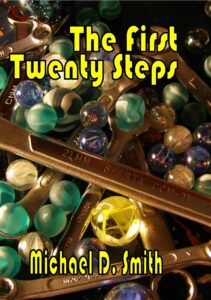 January 2011 saw my foray into self-publishing with The First Twenty Steps, and then the unbelievable acceptance in March of The Martian Marauders by Double Dragon Publishing. I was delighted to at last be part of the publishing world. I told some staff at work, but it wasn’t until a coworker graciously brought it up in a staff meeting did it sink in that my world had shifted.
January 2011 saw my foray into self-publishing with The First Twenty Steps, and then the unbelievable acceptance in March of The Martian Marauders by Double Dragon Publishing. I was delighted to at last be part of the publishing world. I told some staff at work, but it wasn’t until a coworker graciously brought it up in a staff meeting did it sink in that my world had shifted.
I was further encouraged when Deron Douglas, the publisher, announced he would accept new series novels if they maintained quality. So on April 28th I sent this email:
I’ve gotten on to the Double Dragon Authors site (and have requested access to the Promoting site), and I saw your April 12th post about multi-book series. I do have two more books in the Jack Commer series after The Martian Marauders: these are Jack Commer, Supreme Commander (59,100 words), and Nonprofit Ladies (81,000 words). I would definitely like to submit them to you whenever you would like.
They are both completed, with various kinds of short and long synopses also finished. I recently had revised all three to be fully congruent with each other, and I’m happy with the results; I think there’s good quality here. I’m now about halfway through a fourth novel in the series, and am finding that each book can zero in on different characters and probe their psyches more.
By May 3rd I had contracts for those. This was all stunning. I also had the experience of writing to another publisher still holding Jack Commer, Supreme Commander to request it be withdrawn from consideration.
Deron assigned an editor who sent me her Martian Marauders edits in late December 2011. This was my first experience using Word review/markup; though at the time I thought this last-minute editing was a normal part of the process, this was really my first hint of her tendency to procrastinate; hey, the book is to be published in ten days! But overall I was always pleased to work with her; she made some great suggestions and never tried to rewrite my novels. An ironic aspect of this process was the number of typos that went unacknowledged by both of us.
Yet I had a disheartening evening early in January 2012, right before publication. I later dismissed it, especially as it seemed a blip in the overall ecstatic feeling of publication, but to my consternation I now received fully edited versions of Jack Commer, Supreme Commander and Nonprofit Ladies from another editor Deron had engaged for those two books.
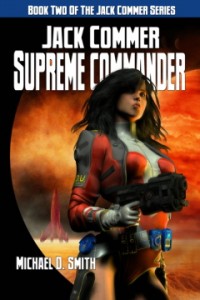 I was stunned by the number of changes in the first few pages of each book, and soon understood that the new editor had essentially rewritten the novels in a style I hardly recognized as my own. The changes actually seemed irrational and I felt the books were seriously marred. I gamely tried to hack the first pages of each book back to some semblance of my style, but it was overwhelming and I gave up. For some reason I didn’t feel I could approach Deron about this–he must have paid this new editor, right?–but I did email my concerns to my first editor, who intervened wondrously and decisively, writing Deron and copying me a screed about the author’s right to his own words. Deron then graciously allowed her to take over the editing for the second and third books.
I was stunned by the number of changes in the first few pages of each book, and soon understood that the new editor had essentially rewritten the novels in a style I hardly recognized as my own. The changes actually seemed irrational and I felt the books were seriously marred. I gamely tried to hack the first pages of each book back to some semblance of my style, but it was overwhelming and I gave up. For some reason I didn’t feel I could approach Deron about this–he must have paid this new editor, right?–but I did email my concerns to my first editor, who intervened wondrously and decisively, writing Deron and copying me a screed about the author’s right to his own words. Deron then graciously allowed her to take over the editing for the second and third books.
In any case, I was thrilled to have a Martian Marauders eBook for sale with a fantastic science fiction theme cover which the multi-talented Deron created himself. I quickly made a publication blog post and updated my Martian Marauders webpage. But, unsure how this book’s evolution from an eighth-grade novel attempt would play with buyers, I deleted that background. Later I saw it as nothing to be ashamed of and expanded the book’s history in a blog post, The Irregular Origin of The Martian Marauders.
I wrote Deron on February 5th about my idea for a title change:
I wanted to ask you what you thought of changing the title to Nonprofit Chronowar. Seeing The Martian Marauders published got me thinking (a lot more seriously than I had previously) about how titles are perceived by the buying public, and I realized that “Nonprofit Ladies” does not really sound like a science fiction title. The women running the nonprofit organizations and their ineffectual attempts to come to terms with inexplicable solar system disasters are really just a subtheme. The main force of the book is space pilot Joe Commer’s war guilt and the United System Space Force realizing that all along it’s been fighting a war based on time travel.
The title Nonprofit Chronowar gives a nod to the first chapters where Joe scolds the naïve ladies and their Committee to End Suffering on Planet Earth, but offers up the main theme of the book as well, marrying the two concepts in an interesting phrase that says “science fiction.” The title also indicates the futility of the war, which both sides know the Alpha Centaurians will lose seventeen years in the future, but which both have no choice but to fight anyway.
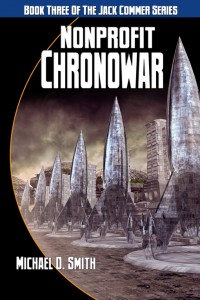 Deron replied that he welcomed anything that would strengthen the SF motif, and I felt better and better about my four-book series.
Deron replied that he welcomed anything that would strengthen the SF motif, and I felt better and better about my four-book series.
A paperback edition of The Martian Marauders followed in March. I’d assumed the eBook would need to demonstrate decent sales before a paperback was issued, but there it was. I was delighted with the arrival of a box of Martian Marauders paperbacks to give away and hawk at book festivals.
A librarian put in a word for me with the Frisco Public Library’s teen writing group, and in March I gave a short presentation there. I didn’t come to promote my book, just to demonstrate what was possible. What I really recall was the kids’ energies and ideas. I asked them how many wanted to write novels, and every hand shot up. That surprised me, as I would’ve thought it would be one-third poetry, one-third stories, and the third wanting to write novels would probably hide their hands. This inspired me to start a teen writing group at McKinney Public Library, where I saw equally intoxicating energies.
On May 14th Double Dragon accepted the fourth Jack Commer novel, Collapse and Delusion. Then Jack Commer, Supreme Commander was published in August. Another lovely cover, starring Jack’s wife Amav. But I was horrified to find a typo on the first page–then I discovered astonishing typos in both The Martian Marauders and Jack Commer. My Martian Marauders villain Sam Hergs had 39 instances of the incorrect possessive form of Herg’s!
I’d naively assumed that any manuscript I sent was without blemish. Or that an editor would catch minor ones. And I had no idea that, as you hurried to meet deadlines, you could easily make further mistakes in the act of correcting errors. I rather overburdened Deron with correction requests until I understood how burdensome it was for him to try to keep up with these changes from all his numerous authors.
In October, rereading the newly-titled Nonprofit Chronowar, I was struck again by remnants of the unintended sense of vulgarity I thought I’d fixed in November 2006, described in A Writing Biography, Part VII. I saw I could fix that by cutting one chapter and changing some other references. My editor agreed and I spent a couple days tightening and improving the book. It came out in May 2013 with another great Deron cover; I’d suggested the spaceships in an email but his take on it was awesome.
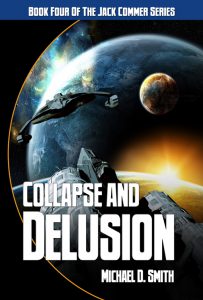 During 2013 I made other publishing inroads: Double Dragon had accepted my story “Perpetual Starlit Night” for its recurring story anthology, and it came out in Twisted Tails VII: Irreverence in February. Meanwhile I struck up correspondence with fellow Double Dragon authors, and one suggested the Ether Books website where my story “Roadblock” was published in December. The Book Daily website also reprinted three of my blog posts.
During 2013 I made other publishing inroads: Double Dragon had accepted my story “Perpetual Starlit Night” for its recurring story anthology, and it came out in Twisted Tails VII: Irreverence in February. Meanwhile I struck up correspondence with fellow Double Dragon authors, and one suggested the Ether Books website where my story “Roadblock” was published in December. The Book Daily website also reprinted three of my blog posts.
Another Double Dragon author steered me towards a title published by Class Act Books. I was still looking to traditional publishing and I was impressed with this title’s cover; in fact, I’d begun ruling out submitting manuscripts to web publishers displaying mediocre-looking covers. So I submitted my novel CommWealth to Class Act and it was accepted in September 2014, with a 2015 publication date. I was on a roll.
Meanwhile I came to terms with my websites. I’d been using WordPress for the blog but was still tied to FrontPage for my main site. I made hundreds of painful manual edits along with some rudimentary CSS to get the site looking solid, but it was obvious the manual era was over. I considered Joomla and Drupal for a new platform, but finally went with the WordPress I was familiar with; as usual I wasn’t curious about how things worked, I just wanted to create content. I converted sortmind.com entirely in 2015, and in October added another sub-site, press.sortmind.com, for Sortmind Press, intended as a more business-oriented platform.
At this time I began to find what could go wrong in publishing. My Double Dragon editor had some serious personal issues that kept postponing work on Collapse and Delusion. Though I sympathized with her, by early 2016, four years after submitting the final MS., I found myself pleading for some progress. Coincidentally, it turned out that she also worked for Class Act and the upcoming August 2015 publication date for CommWealth spurred her to finish that book for Class Act by late July.
I’ll return to Class Act, but to cut back to Collapse and Delusion, I finally wrote Deron about the situation; he said he was no longer using editors and that competent beta readers would work. So I engaged my wife Nancy and my new McKinney Public Library friend Kara Wilson, a fellow SF author, and got a polished MS. off to Deron in May 2016. Meanwhile I sent my editor a note I hoped was gracious, informing her we were taking both Collapse and Delusion and the fifth Jack Commer novel, The Wounded Frontier, off her hands, and said: “I’ve internalized much of what you’ve contributed to these works and this has provided a good foundation for my future writing and for examining the finished works with new tools.”
Collapse and Delusion came out in July 2016 with another great science fiction cover. It was also the first book to rein in the italicization and came off as the cleanest Jack Commer yet.
 My interaction with Class Act Books in 2015 was a major prod to self-publishing. First of all, in contrast to what attracted me to this publisher in the first place–the other author’s excellent cover–the artist’s first cover for CommWealth was exceedingly mediocre. When I sent my painting “Property” as a suggestion for revision, the artist decided to use it instead. This was flattering; though the resulting new cover wasn’t overpowering, it worked decently.
My interaction with Class Act Books in 2015 was a major prod to self-publishing. First of all, in contrast to what attracted me to this publisher in the first place–the other author’s excellent cover–the artist’s first cover for CommWealth was exceedingly mediocre. When I sent my painting “Property” as a suggestion for revision, the artist decided to use it instead. This was flattering; though the resulting new cover wasn’t overpowering, it worked decently.
In late July my editor finished CommWealth; I approved her corrections and she forwarded the manuscript to the publisher, who did a final copyedit. But what followed was much more extreme than the clumsy January 2012 editor pawings at Jack Commer and Nonprofit Ladies.
A few days before publication I got the CommWealth PDF galley and was told editing was done, but that I could note corrections on a separate Word document. But the “copyediting” threw the novel into chaos. Basically the book looked machine-edited, searching and replacing exclamation points with periods, removing almost all italic emphasis (though this influenced the reduction of italics in Collapse and Delusion), and making arbitrary changes to virtually every paragraph. Not only did it make the characters sound as if they were on Valium, it also introduced errors like:
“Don’t break the screen. I’m not gonna clean up that glass.” Jill said.
“Jill.” he whispered fiercely.
“Lisa. God, I love you.” Allan laughed, moving to grab her.
Other introduced errors included:
What a profile…that long dark hair and those piercing dark eyes…that blue bicycle shirt over his lean hard tors…— I’m not really shopping for a man, am I?
“Huh…?” Who cares about steady work? Everyone’s fixed for life with CommWealt, ahe’s beautiful.
Forensic Squad cab take turns always asking for it back.
These are only a few examples in just the first twenty pages and I wrote the publisher a long email in protest. Although I was ready to pull the book, losing the $200 for the cover and processing, I recalled an old piece of advice for complaints, which is to place your desired outcome in the first sentence:
Is there any way to return to the version the editor and I worked on in July and which she sent back to you early August? I’m not sure where the new edits came from but I’m finding that the whole tone of the novel is now so seriously off that it doesn’t even seem like my own writing.
The publisher relented and CommWealth was published as I wanted on August 15th. I was happy with it, though I didn’t sell a single copy from their website or through Amazon. Still, I did sell a few at book fairs.
 The best thing about Class Act was its publicist, who got its authors web interviews. I did several and they were all hard yet fun work. But in early 2020 our publicist notified us that Class Act was apparently dead, its site moribund and its publisher unresponsive. I tried the publisher several times via email and letter, requesting her to pull CommWealth, but never got a reply. I even spent a long time doing obituary searches but turned up nothing. I sent copyright infringement protests to both Scribd and Amazon, and their Class Act pages were soon mercifully gone, leaving me clear to finally self-publish CommWealth with a round of improvements and a much better cover.
The best thing about Class Act was its publicist, who got its authors web interviews. I did several and they were all hard yet fun work. But in early 2020 our publicist notified us that Class Act was apparently dead, its site moribund and its publisher unresponsive. I tried the publisher several times via email and letter, requesting her to pull CommWealth, but never got a reply. I even spent a long time doing obituary searches but turned up nothing. I sent copyright infringement protests to both Scribd and Amazon, and their Class Act pages were soon mercifully gone, leaving me clear to finally self-publish CommWealth with a round of improvements and a much better cover.
The Class Act expedience was quite educational and I’m not bitter about it. In addition to getting those great interviews, becoming aware of my italics overuse, and seeing what could be done to address untoward situations, it pushed me to self-publishing and boosted my confidence as a writer.
Double Dragon published the fifth and sixth books in the Jack Commer Series in 2018, The Wounded Frontier and The SolGrid Rebellion, with Deron incorporating my character images into the covers. But I think by this time most Double Dragon authors knew the end was coming. In July 2020 Deron informed his authors that he was selling Double Dragon to a British publisher. But since rights reverted to me and I wanted full control over my work, I opted not to go the British route. I bought rights to the six covers along with seven ISBNs for self-publishing the first six novels plus the seventh I’d been working on, Balloon Ship Armageddon.
I redid the series, not only to correct typos and excessive italics but to revamp the chronology to start in 2028 instead of 2021–just six months away! 2028 gave me some breathing space, but science fiction allowed me to rejuvenate all the characters, and despite earlier action still occurring from 2028 on, the characters now scheme and strive in the 2070s. I’m done with Jack Commer anyway, with a branch series, Supreme Commander Laurie, now underway.
It took me time to rethink traditional publishing with its lottery-ticket luck, popular tropes, good editors and bad. I’d sent one query for The Soul Institute in 2011 and one for Akard Drearstone in 2012, both mentioning my new credits with Double Dragon; their rejections didn’t hurt my pride but contributed to the sense that traditional publishing was a system beyond my control. I had much I wanted to accomplish instead of waiting indefinitely for my luck to break. My readiness to dump Class Act in 2015 and self-publish CommWealth, as I’d learned to do with The First Twenty Steps in 2011, was the turning point.
Now, much more wary of small new independent publishers dying in three years after selling zero copies of an author’s work, I finished my flagship novel The Soul Institute and published it on Amazon and Smashwords in December 2015. Using Sortmind Press felt right and I’ve never looked back. With a sense of things moving in the right direction, I feel none of the desperation to publish I had in earlier eras.
In 2017 I published Akard Drearstone and in 2019 Sortmind and Jump Grenade, the original idea of which came from a ninth-grade story. 2021 saw Balloon Ship Armageddon and the Jack Commer companion books The UR Jack Commer, a compilation of Jack origin stories, and The Balloon Ship Interviews, twelve character interviews originally posted to the blog. I’ve made little attempt to market those small paperbacks; I figure if anyone buys the complete Jack Commer series at a book fair I’ll toss them in for free.
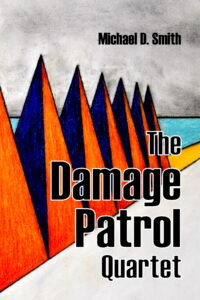 The Damage Patrol Quartet in late 2021 pulled together four of my best stories; “Roadblock,” “Randy and Laura, “Perpetual Starlit Night,” and “Damage Patrol.” I’d briefly toyed with expanding “Perpetual Starlit Night” into a novel but finally saw that the story was perfect in itself. The collection came off well, even though I’d long ago decided that novels were my expression.
The Damage Patrol Quartet in late 2021 pulled together four of my best stories; “Roadblock,” “Randy and Laura, “Perpetual Starlit Night,” and “Damage Patrol.” I’d briefly toyed with expanding “Perpetual Starlit Night” into a novel but finally saw that the story was perfect in itself. The collection came off well, even though I’d long ago decided that novels were my expression.
Marketing arose as a new task: websites, blogs, book fairs, interviews, sales, Amazon and other venues, eBooks and paperbacks and hardbacks, social media, and the much-resisted need for “branding” myself. Am I a science fiction author or a literary author? Should Michael D. Smith have a clever pseudonym? How do I present myself?
I set up the Writers’ Exchange group to discuss these aspects with other writers and treasured the interaction. After all these years of experimenting I feel comfortable with the self-publishing process, though there’s always much to learn. Of course I have to consider my current rank on Amazon (The Martian Marauders now at #7,300,960), low sales, lack of worldwide fame and shattering influence on twenty-first-century American culture.
But despite the lack of standard success I’ve been satisfied with my journey. I have some new novels to write and I’m looking forward to the total artistic control I’ll continue to assert. To quote from one of my favorite blog posts, What Does Your Muse Think of Your Writing Career?:
… somehow I have been prevented/preserved for this time. That my writing life is developing exactly the way it should have–in obscurity, protecting me from my own BS until I finally learned how to face reality and be honest with myself. From here on out I have the possibility of giving a gift to others.
I now seem to have a “writing life” instead of a “writing career.” That has made a real difference to me.
My Works Published by Other Publishers During this Period
- The Martian Marauders, Double Dragon Publishing, 2012
- Jack Commer, Supreme Commander, Double Dragon Publishing, 2012
- “Perpetual Starlit Night,” Double Dragon Publishing in Twisted Tails VII, 2013
- Nonprofit Chronowar, Double Dragon Publishing, 2013
- “Roadblock, ” Ether Books website, 2013
- Take My Word for It, republished on the Book Daily website, 7/10/13
- On the Essential Meaninglessness of the Word “Metaphysical” retitled “Unfocused Queries” and republished on the Book Daily website, 7/31/13
- How Do you Deal With Your Backlog?, retitled “Should you publish your backlog?” and republished on the Book Daily website, 9/30/13
- CommWealth, Class Act Books, 2015
- Collapse and Delusion, Double Dragon Publishing, 2016
- The Wounded Frontier, Double Dragon Publishing, 2018
- The SolGrid Rebellion, Double Dragon Publishing, 2018
Sortmind Press Self-Publishing 2011-2021
Showing minor revision uploads as I kept learning what works best:
- The First Twenty Steps, 2011
- The Soul Institute, 2015, 2020, 2024
- Akard Drearstone, 2017
- Sortmind, 2019
- Jump Grenade, 2019
- The Martian Marauders (Jack Commer Book 1), 2020, 2023
- Jack Commer, Supreme Commander (Jack Commer Book 2), 2020, 2023
- Nonprofit Chronowar (Jack Commer Book 3), 2020, 2023
- CommWealth, 2020, 2023
- Collapse and Delusion (Jack Commer Book 4), 2020, 2023
- Trip to Mars, the Picture Book, 2017
- The Wounded Frontier (Jack Commer Book 5), 2020, 2023
- The SolGrid Rebellion (Jack Commer Book 6), 2020, 2023
- Balloon Ship Armageddon (Jack Commer Book 7), 2021, 2023
- The UR Jack Commer, 2021
- The Balloon Ship Interviews, 2021
- The Damage Patrol Quartet, 2021
Theme 4: The Blog Voice
An early post, The Blog Evolving into the Entire Journey, described the blog becoming a new writing voice:
I foresee the blog gradually becoming a specialized body of work, and it should all be current, despite the past dates. Let it evolve on its own. Dare to make a few mistakes along the way.
The best thing so far about the sortmind blog is its mixture of essays and stories and art: creative work juxtaposed with ruminations on it. I want the blog to be a good overview of my writing and visual art, as well as the processes I use. An accessible repository of sample writing, drawing, and painting.
In no way do I conceive of this blog as anything like “social networking.” I can appreciate how blogs have developed as structured personal websites with comment and networking capability, but I just want to master the game as self-expression, and see where it leads.
My journal-writing and my essay-writing voices are personal. The blog created a combination journal- and letter-writing voice, and I want it to be as clear and direct as possible. The reader should know where I’m coming from and hopefully receive something valuable.
Most posts are reflections on writing or art processes; some are marketing, announcements, or reviews. Excerpts from novels and character drawings market a book but try to give something back. Each of the eight writing biographies describes a topic I’ve needed to explore. I dreaded starting each one, fearing there was no way to describe those eras, but I’m amazed each has turned out so well.
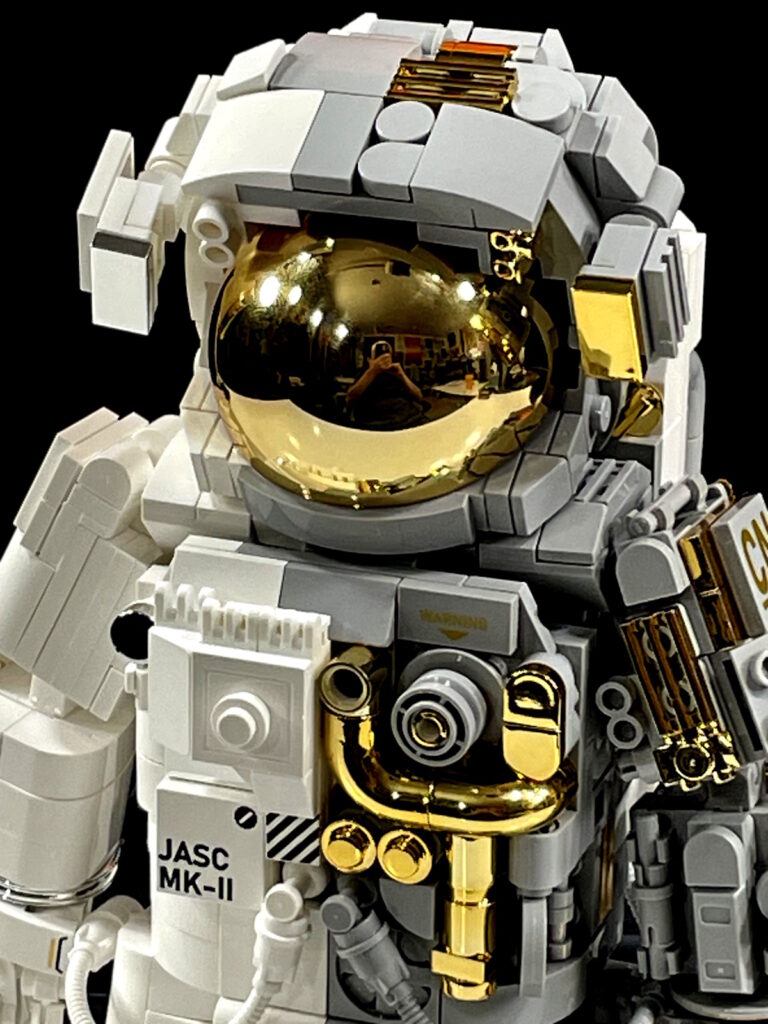 The most fun and compelling blog posts:
The most fun and compelling blog posts:
- Five Query Letters, 8/9/10
- Flashpoint’s Daughter, 11/6/10
- Dystopias—And I’ve Written My Share, 3/13/11
- My Visual Art is Somehow Literary, 4/12/11
- An Archeological Excavation of Akard Drearstone, Draft 1, 7/19/11
- What Does Your Muse Think of Your Writing Career?, 8/20/11
- Homage to the Wiess Cracks, 8/27/11
- Take My Word for It, 12/15/11
- How Do You Deal With Your Backlog?, 2/29/12
- Being a Novelist as Opposed to a Short Story Writer, 12/28/12
- If No Internet or Word Processing, 3/9/13
- The Irregular Origin of The Martian Marauders, 10/19/13
- Default Forces, 3/4/14
- Justification, or, Flush These Notes Out of My System Before They Wreck a Novel!, 7/5/14
- A Writing Biography, Part I: First Efforts in The Gore Book, 9/24/14
- A Writing Biography, Part II: The Blue Notebook, 9/28/14
- A Writing Biography, Part III: Unhappy Kid Interlude, Yet Two Novels, Sort Of, 10/14/14
- Homage Part 1: Farewell to The University of Mars, 4/4/15
- Homage Part 2: The Zarreich Enigma, 4/19/15
- My Ancient and Unfortunately Unshakable Visualization of the Solar System, 7/12/15
- Make Way for Ducklings by Robert McCloskey and the Endless Slog to Sanctuary and Transcendence, 7/22/16
- The Tower Treasure Project, 8/18/16
- Crisis! Restructure Major Metropolitan Library!, 10/6/16
- Three Legacy Novels, 6/18/17
- Amid Work on Three Karmic Novels, 9/17/17
- I’ll Write Your Book Blurbs, or, When Lilith’s Beloved Kentucky Horse Farm Goes into Bankruptcy …, 11/9/17
- The Alpha Centaurian Stars, 3/19/18
- Jack Commer Book Seven Interviews, 1: Rick Ballard, 4/26/18
- Jack Commer Book Seven Interviews, 2: T’ohj’puv, 4/30/18
- Jack Commer Book Seven Interviews, 3: Jonathan James Commer, 5/1/18
- Jack Commer Book Seven Interviews, 4: Amy Nortel, 5/2/18
- Jack Commer Book Seven Interviews, 5: Jack Commer, 5/7/18
- Jack Commer Book Seven Interviews, 6: Amav Frankston-Commer, 5/9/18
- Jack Commer Book Seven Interviews, 7: Waterfall Sequence, 5/11/18
- Jack Commer Book Seven Interviews, 8: Ranna Kikken Commer, 5/13/18
- Jack Commer Book Seven Interviews, 9: Joe Commer, 5/15/18
- Jack Commer Book Seven Interviews, 10: Jackie Vespertine, 5/17/18
- Jack Commer Book Seven Interviews, 11: Laurie 283, 5/19/18
- Jack Commer Book Seven Interviews, 12: Laurie Lachrer, 5/21/18
- Allan Larson Talks Back, 5/25/18
- CommWealth and My Stint in the Theater, 8/9/18
- The Karma of Fancy One-Line Blog Posts, 8/14/18
- When the Shirt Hits the Fan: More Musing on Typos, and the Sortmind Editing Passes, 3/9/19
- Jump Grenade – The Author Interview, 10/10/19
- Shackism v. Sortmind, Part Three, 11/25/19
- The Blank Zen Interview, 6/27/20
- The Balloon Ship Interviews: Arrogant, Desperate Characters Audition for the Role of a Lifetime, 4/6/21
- Interview with the Burlcron/Mercer/Singletree, 8/3/21
- A Writing Biography, Part IV: The Perfect Cube and Beyond, 11/2/21
- Walter’s Farewell Soliloquy–to Himself and to Draft 1 Caspra Coronae, 2/26/22
Theme 5. The Three Long Novels
I wanted to finish my main legacy work as I moved into new writing, and 2011-2023 saw the restructuring and publication of my three long novels, The Soul Institute, Akard Drearstone, and Sortmind. All are literary despite their absurdist elements.
The Soul Institute, 2015
 Computer technician Himal Steina realizes his dream of a mythic return to the sanctuary of a vast foggy university when he’s appointed writer in residence at the Soul Institute and falls in love with one of its numerous faculty goddesses.
Computer technician Himal Steina realizes his dream of a mythic return to the sanctuary of a vast foggy university when he’s appointed writer in residence at the Soul Institute and falls in love with one of its numerous faculty goddesses.
The Soul Institute is my flagship novel, lengthy and complex, but I think it reads quickly. It covers several sets of characters including Soul Institute administrators and faculty pursuing farcical love affairs and power struggles; the students who come to live the life of soul but are dismayed by the underlying chaos; and ninth graders in their separate world of inhalant abuse and gang violence. This is my only novel that adds a genealogical chart.
Akard Drearstone, 2017
 A cinder block falls on lead guitarist Akard Drearstone’s head and leads to an alternate 1975 history of rock music as seen through the eyes of a twelve-year-old girl.
A cinder block falls on lead guitarist Akard Drearstone’s head and leads to an alternate 1975 history of rock music as seen through the eyes of a twelve-year-old girl.
I resumed this project dreading I might have to dump it for good. The first thirteen chapters were just not working, but when I hit chapter fourteen I began to feel the marvelous energy that had lurked in the novel from the beginning, and I was able to revitalize the structure and infuse Draft Twelve with modern consciousness. I left the book set in 1975 and thus it becomes my only historical novel.
I also set myself the challenge of using a young girl as a narrator, and it worked. Some of Akard’s characters are the most four-dimensional I’ve created. The music descriptions shine with renewed force; in fact, this was the first time I realized the emphasis is more on how the audience hears music as opposed to what the musicians experience.
Sortmind, 2019
 An answer to any question is delivered in a telepathic instant, and a database of all our queries tracks the progress of a coming apocalypse. High school art students Oliver and Sam find themselves blindsided by urban terrorism and the malfunctioning, reality-altering Sortmind app.
An answer to any question is delivered in a telepathic instant, and a database of all our queries tracks the progress of a coming apocalypse. High school art students Oliver and Sam find themselves blindsided by urban terrorism and the malfunctioning, reality-altering Sortmind app.
I began Sortmind in 1987 as an expression of my early library career, but I eventually rebooted it as the story of a start-up company that telepathically provides all known information, and the ensuing urban riots. The book also chronicles two sets of aliens with opposing ideas about dealing with the malfunctioning human race, and serves as a Bildungsroman for the teen characters.
I’d sent the first version of Sortmind to publishers through the mid-nineties, but as I grew as a writer the daunting realization came that the novel was bloated and out of date. New drafts, cosmetic revisions, and frantic fixes only pointed to Book Abandonment. But with nothing to lose, I engineered a major reboot in 2016, which transmuted the novel, 45% of its original length, into something far beyond what I could have imagined in 1987.
The UR Manuscripts and Their Legacies
In homage to the first-draft energies of these three works, I made non-published eBooks and/or paperbacks of each.
 Alternate Soul Institute, 2015
Alternate Soul Institute, 2015
Draft 1 of The Soul Institute was 382,000 words, 200,000 longer than the final version, but it contains sprawling reflections and alternate plot, some of which, upon rereading, I couldn’t remember composing, as if some fan fiction writer had contributed his or her take on the book. Thus was born Alternate Soul Institute, an EPUB version confining itself to these unused sections. I know why I cut what I did from the monstrous first draft, but there are a lot of intriguing psychological chapters in Alternate Soul Institute, like outtakes and deleted scenes from movies.
 Akard Draft One, 2020
Akard Draft One, 2020
Akard Draft One was my first breakthrough after two practice novels. I’d long wanted a digital copy; I didn’t even have a photocopy. I spent two months on a scanning project, editing the resulting manuscript but not proofing it against the paper manuscript. The 5 MB Word document is 681,656 words in 2,376 pages. I made non-published paperback copies on lulu.com just to be able to hold the dream of that first big novel in my hands.
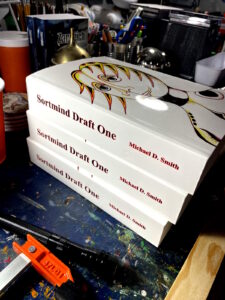 Sortmind Draft One, 2024
Sortmind Draft One, 2024
The final 2019 Sortmind is so much improved over its first draft that no reader would consider returning to the original. But I discovered a clean photocopy of the typewritten Draft 1 and, sheet-feeding thirty pages at a time, I quickly got the entire 1,075-page manuscript into PDF format and then OCR’d it. Despite the first-draft problems there are intriguing reflections on technology and society; I appreciate this first version as its own completed 1980s thought, and made a hefty Sortmind Draft One unpublished paperback to celebrate it.
Theme 6: New Novel Notes and Beyond
As is certainly evident by now, the era covered by Part VIII concerns past energies and new exploration. I’m concluding the Writing Biography series here as the next stage hasn’t happened yet, though 2023-24 saw Sortmind Press publication of four more novels and another short story collection.
For a long time I’ve felt there’s another long literary novel rattling around. “New Novel Notes” from December 2015 on was an arduous attempt at a big book which I finally focused into the shorter novel Asylum and Mirage in 2022-2023. The “Asylum and Mirage Diary” chronicling its long evolution runs 144 single-spaced spaces. The final Asylum and Mirage in fact finished off these endless “New Novel Notes” and I have no desire to resurrect them. But the impulse for another long, complex, sprawling, character-driven novel wants to find expression in A Writing Biography Part IX.
Copyright 2025 by Michael D. Smith
A Writing Biography, Part I: First Efforts in The Gore Book
A Writing Biography, Part II: The Blue Notebook
A Writing Biography, Part III: Unhappy Kid Interlude, Yet Two Novels, Sort Of
A Writing Biography, Part IV: The Perfect Cube and Beyond
A Writing Biography, Part V: Space, Time, and Tania through The University of Mars, 1974-1982
A Writing Biography, Part VI: Failures, Successes, Rhythms and Swerves, 1983-1994
A Writing Biography, Part VII: Organization, Lost Energies, New Novels, Publishing, 1994-2011

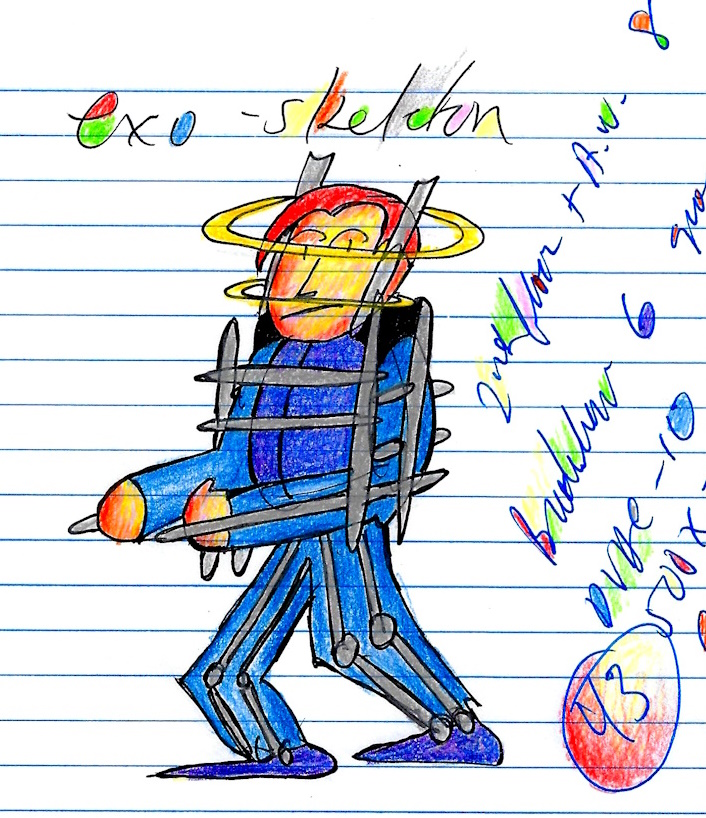


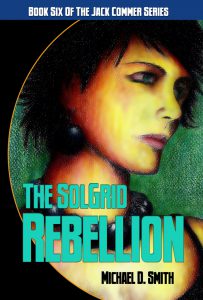



Comments
A Writing Biography, Part VIII: The Exoskeleton, Archiving, Publishing, The Blog, and the Long Novels, 2011-2023 — No Comments
HTML tags allowed in your comment: <a href="" title=""> <abbr title=""> <acronym title=""> <b> <blockquote cite=""> <cite> <code> <del datetime=""> <em> <i> <q cite=""> <s> <strike> <strong>